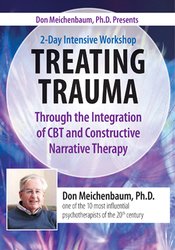

Learn from one of the world’s leading psychotherapists and cofounder of CBT, Dr. Don Meichenbaum, as he teaches how to integrate Constructive Narrative Therapy with Cognitive Behavioral Therapy to achieve better clinical outcomes with your clients who have experienced trauma.
This two-day, intensive recording will demonstrate how to integrate the two approaches to effectively treat challenging clients with a variety of co-occurring disorders, including PTSD, Complex PTSD, Borderline Personality Disorder, substance abuse disorders (including opioid abuse) and more! In addition, Dr. Meichenbaum will highlight specific strategies that “expert” psychotherapists do to achieve lasting changes in their clients.
Watch Dr. Meichenbaum as he shares his vast clinical and research experience in a humorous, engaging manner. Using video case presentations, he will walk you through how to implement various treatment interventions that you can use in your very next session with clients. What’s more, you’ll be provided with detailed, practical handouts to accompany your new skills.
This online program is worth 11.75 hours CPD.
| File type | File name | Number of pages | |
|---|---|---|---|
| Manual - 2 Day Intensive Workshop: Treating Trauma (15.99 MB) | 184 Pages | Available after Purchase | |
| Manual - 2 Day Intensive Workshop: Treating Trauma - French (15.99 MB) | 184 Pages | Available after Purchase | |
| Manual - 2 Day Intensive Workshop: Treating Trauma - French (15.99 MB) | 184 Pages | Available after Purchase | |
| Manual - 2 Day Intensive Workshop: Treating Trauma - Italian (15.99 MB) | 184 Pages | Available after Purchase | |
| Manual - 2 Day Intensive Workshop: Treating Trauma - Italian (15.99 MB) | 184 Pages | Available after Purchase |

Don Meichenbaum, Ph.D., is Distinguished Professor Emeritus from the University of Waterloo, Ontario, Canada from which he took early retirement 20 years ago. He is presently Research Director of the Melissa Institute for Violence Prevention in Miami (Please see www.melissainstitute.org). He is one of the founders of Cognitive Behavior Therapy.
In a survey of clinicians reported in the American Psychologist he was voted “one of the ten most influential psychotherapists of the 20th century.” He has received a Lifetime Achievement Award from the Clinical Division of the American Psychological Association and was Honorary President of the Canadian Psychological Association.
He has presented in all 50 U.S. states and internationally. He has published extensively and most recently published Roadmap to Resilience: A Guide for Military Trauma Victims and Their Families (visit www.roadmaptoresilience.com). His other books include Treatment of Individuals with Anger Control Problems and Aggressive Behavior; Stress Inoculation Training; Facilitating Treatment Adherence; and The Unconscious Reconsidered.
He has consulted for various populations including veterans’ hospitals, the National Guard, psychiatric treatment centers for children, adolescents and adults, treatment center for individuals with traumatic brain injuries, torture victims, Native populations, deaf populations and school boards. See papers by Dr. Meichenbaum on www.melissainstitute.org (go to home page and click on Author’s Index and scroll to Meichenbaum).
Speaker Disclosures:
Financial: Donald Meichenbaum is Research Director of the Melissa Institute for Violence Prevention and Treatment. He is the Distinguished Professor Emeritus for the University of Waterloo, Ontario, Canada. Dr. Meichenbaum receives a speaking honorarium from PESI, Inc. He has no relevant financial relationships with ineligible organizations.
Non-financial: Donald Meichenbaum has no relevant non-financial relationship to disclose.
Satisfaction Guarantee
Your satisfaction is our goal and our guarantee. Concerns should be addressed to info@pesi.co.uk or call 01235847393.
Please wait ...